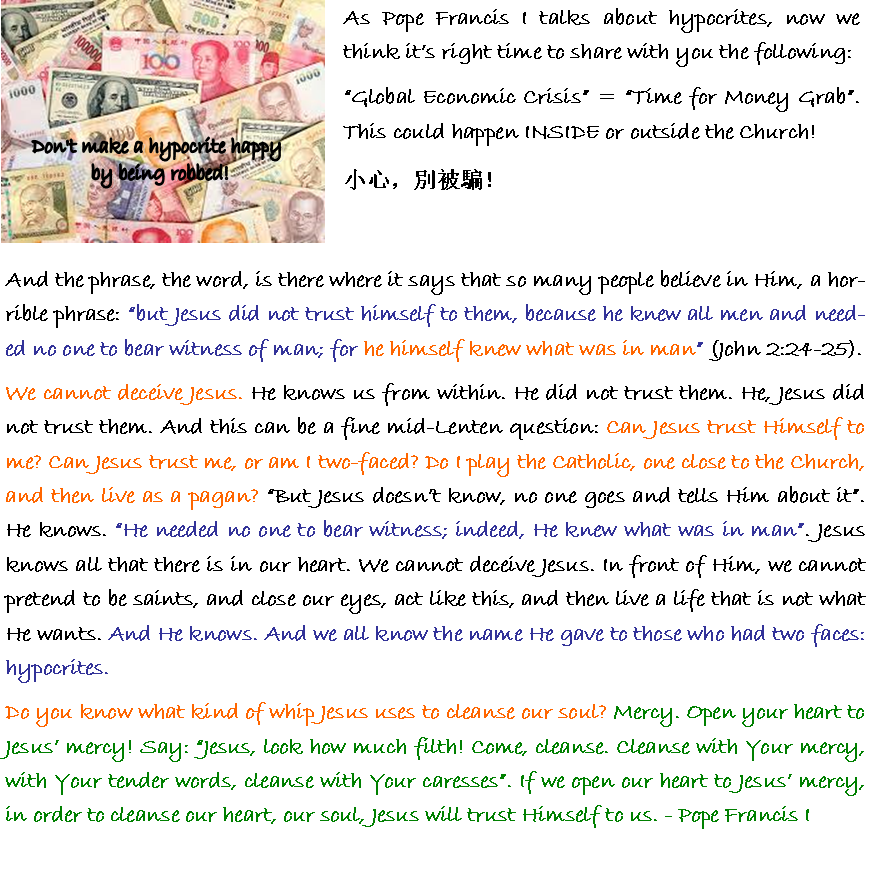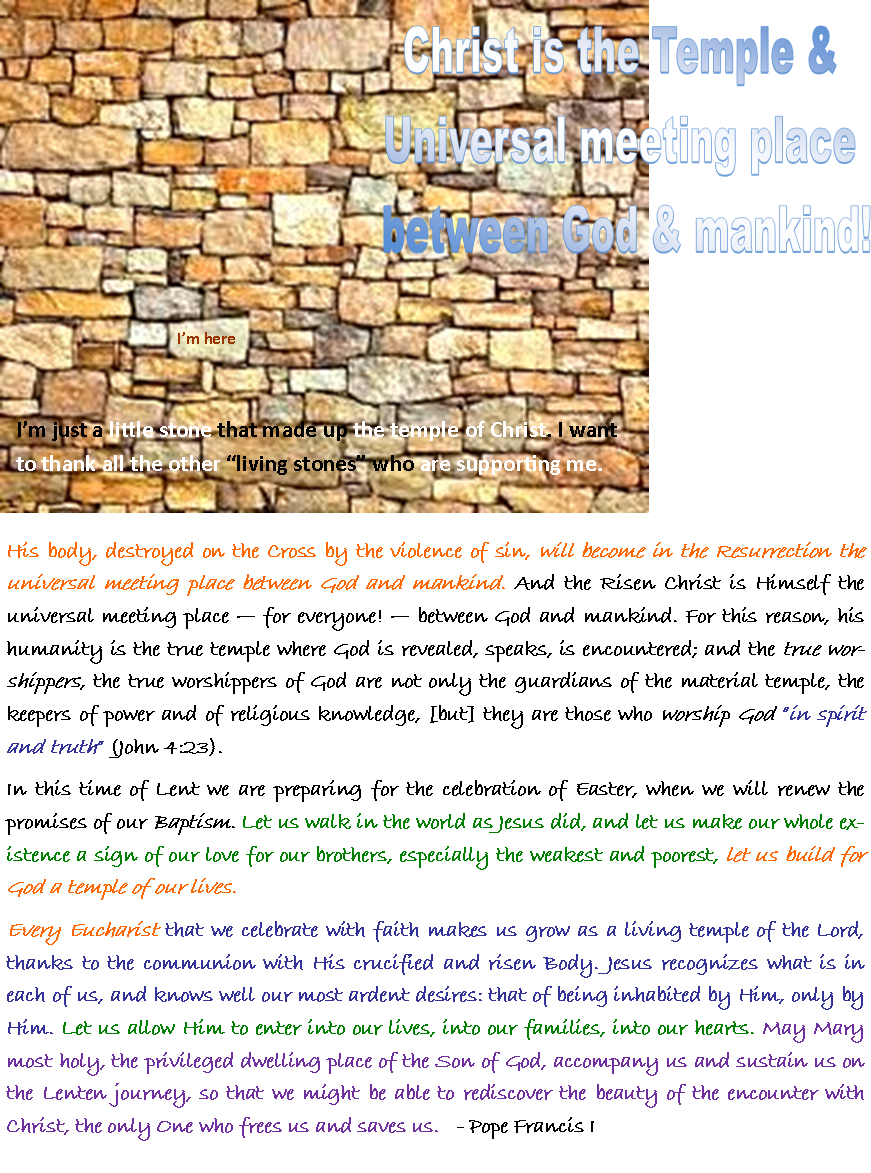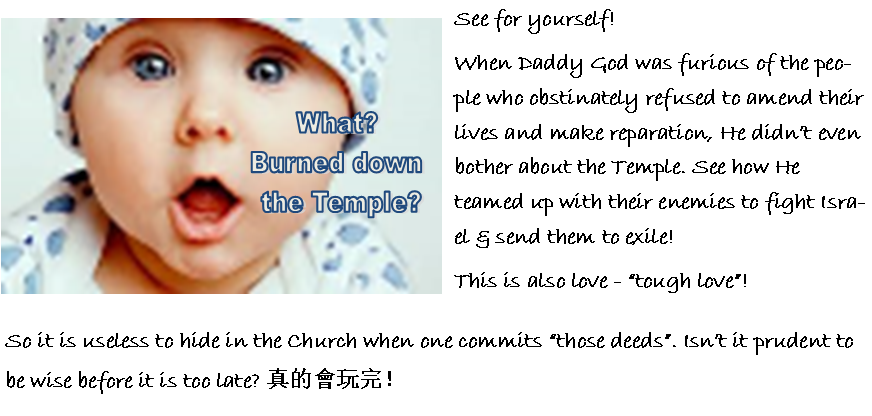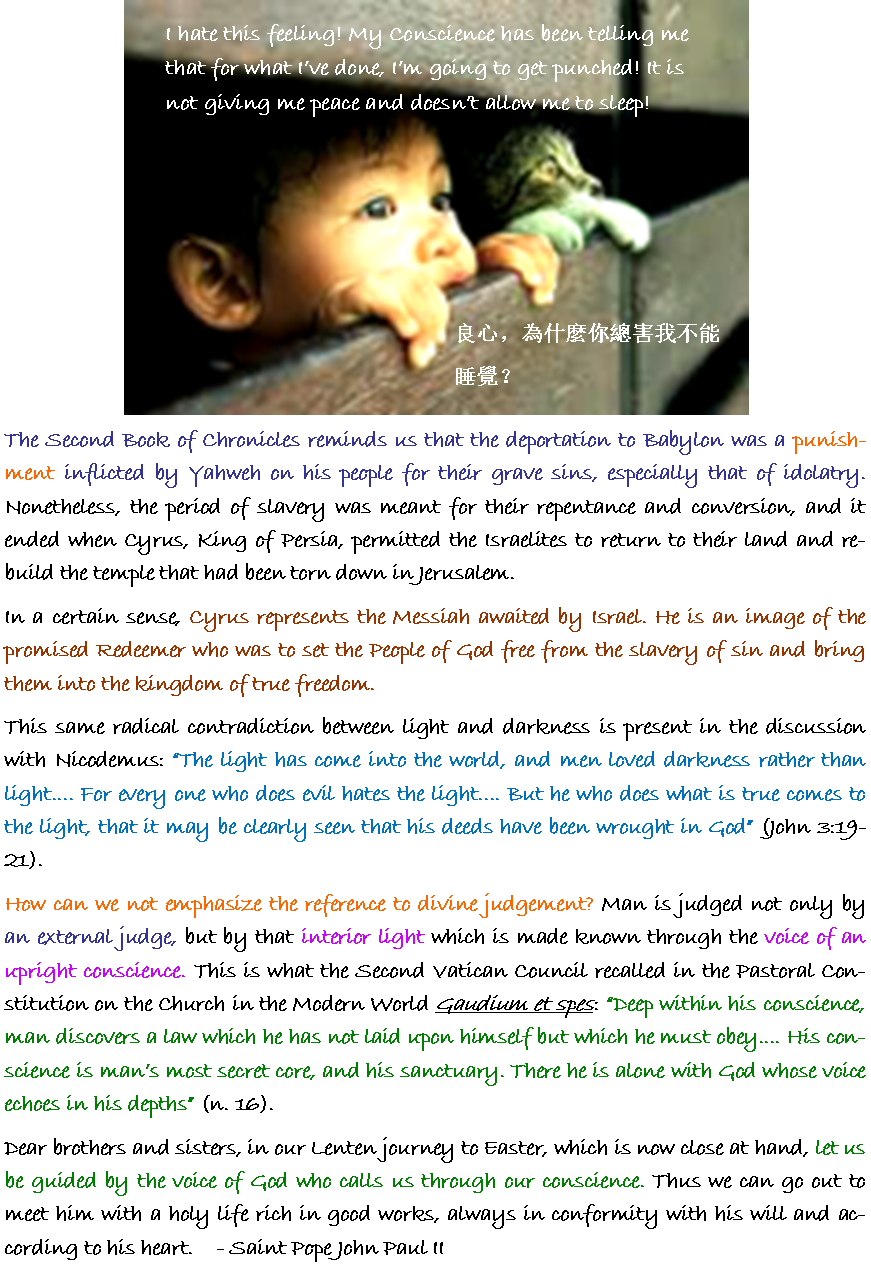|
159 |
|
BENEDICT XVI ANGELUS Saint Peter's Square
Dear Brothers and Sisters,
I shall be making my first Apostolic Journey to Africa from Tuesday 17 to Monday 23 March. I shall go to Cameroon, to the capital, Yaoundé, to present the "Instrumentum Laboris", [working document] of the Second Special Assembly for Africa of the Synod of Bishops that will be celebrated here in the Vatican in October. I shall then go on to Luanda, the capital of Angola, a country which has rediscovered peace after the long civil war and is now called to rebuild itself in justice. With this Visit I intend to embrace in spirit the entire African continent: its thousands of differences and its profoundly religious soul; its ancient cultures and its laborious process of development and reconciliation; its grave problems, its painful wounds and its enormous potential and hopes. I intend to strengthen Catholics in the faith, to encourage Christians in their ecumenical commitment and to bring to all the announcement of peace, entrusted to the Church of the Risen Lord.
As I prepare myself for this missionary Journey the words of the Apostle Paul, which today, on the Third Sunday of Lent, the liturgy proposes for our meditation, resound in my mind: "We preach Christ crucified: a stumbling block to Jews and folly to Gentiles, but to those who are called, both Jews and Greeks, Christ [is] the power of God and the wisdom of God", the Apostle writes to the Christians of Corinth (1 Corinthians 1: 23-24). Yes, dear brothers and sisters! I am leaving for Africa aware that I have nothing to propose or give to those whom I shall meet except Christ and the Good News of his Cross, a mystery of supreme love, of divine love that overcomes all human resistance and even makes forgiveness and love for one's enemies possible. This is the grace of the Gospel that is capable of transforming the world; this is the grace that can also renew Africa, because it generates an irresistible force of peace and a profound and radical reconciliation. The Church, therefore, does not pursue economic, social or political objectives; the Church proclaims Christ, certain that the Gospel can move the hearts of all and transform them, thereby renewing people and societies from within.
On 19 March, precisely during my Pastoral Visit to Africa, we shall celebrate the Solemnity of St Joseph, Patron of the universal Church and my personal Patron too. St Joseph, warned by an angel in a dream, had to flee with Mary to Egypt in Africa, to take Jesus, whom King Herod wanted to kill, to safety. Thus the Scriptures were fulfilled; Jesus trod in the footsteps of the ancient patriarchs, and, like the People of Israel, returned to the Promised Land after having been in exile in Egypt. I entrust to the heavenly intercession of this great Saint my upcoming Pilgrimage and the populations of the whole of Africa, together with the challenges that mark them and the hopes that enliven them. I am thinking in particular of the victims of hunger, disease, injustice, fratricidal conflicts and of every form of violence which unfortunately continues to afflict adults and children, without sparing missionaries, priests, men and women religious and voluntary workers. Brothers and sisters, accompany me on this Journey with your prayers, invoking Mary, Mother and Queen of Africa. ---------------------------------------------------------
After the Angelus:
I welcome all the English-speaking pilgrims and visitors present at today's Angelus. As we continue our Lenten journey may our resolve to follow Jesus be strengthened through prayer, forgiveness, fasting and assistance to those in need. This Tuesday I leave Rome for my visit to Cameroon and Angola. My presence on the great Continent of Africa forms part of the preparation for the Special Assembly of the Synod of Bishops dedicated to the theme: "The Church in Africa in Service to Reconciliation, Justice and Peace". I ask each of you to join me in praying that my visit will be a time of spiritual renewal for all Africans and an occasion in which civic and religious leaders will strengthen their resolve to walk the path of justice, integrity and compassion. May the lives of African men, women and children be transformed in hope! Upon all of you gathered here and your loved ones, I gladly invoke the strength and peace of Christ the Lord. I wish you all a good Sunday. |

|
VISIT TO THE ROMAN PARISH HOMILY OF HIS HOLINESS POPE FRANCIS Third Sunday of Lent, 8 March 2015
In the Gospel passage that we heard, there are two things that strike me: an image and a word. The image is that of Jesus, with whip in hand, driving out all those who took advantage of the Temple to do business. These profiteers who sold animals for sacrifices, changed coins.... There was the sacred — the Temple, sacred — and this filth, outside. This is the image. And Jesus takes the whip and goes forth, to somewhat cleanse the Temple.
And the phrase, the word, is there where it says that so many people believe in Him, a horrible phrase: “but Jesus did not trust himself to them, because he knew all men and needed no one to bear witness of man; for he himself knew what was in man” (John 2:24-25).
We cannot deceive Jesus. He knows us from within. He did not trust them. He, Jesus did not trust them. And this can be a fine mid-Lenten question: Can Jesus trust Himself to me? Can Jesus trust me, or am I two-faced? Do I play the Catholic, one close to the Church, and then live as a pagan? “But Jesus doesn’t know, no one goes and tells Him about it”. He knows. “He needed no one to bear witness; indeed, He knew what was in man”. Jesus knows all that there is in our heart. We cannot deceive Jesus. In front of Him, we cannot pretend to be saints, and close our eyes, act like this, and then live a life that is not what He wants. And He knows. And we all know the name He gave to those who had two faces: hypocrites.
It will do us good today, to enter our hearts and look at Jesus. To say to Him: “Lord, look, there are good things, but there are also things that aren’t good. Jesus, do You trust me? I am a sinner...”. This doesn’t scare Jesus. If you tell Him: “I’m a sinner”, it doesn’t scare Him. What distances Him is one who is two-faced: showing him/herself as just in order to cover up hidden sin. “But I go to Church, every Sunday, and I...”. Yes, we can say all of this. But if your heart isn’t just, if you don’t do justice, if you don’t love those who need love, if you do not live according to the spirit of the Beatitudes, you are not Catholic. You are a hypocrite. First: can Jesus trust Himself to me? In prayer, let us ask Him: Lord, do You trust me?
Second, the gesture. When we enter our hearts, we find things that aren’t okay, things that aren’t good, as Jesus found that filth of profiteering, of the profiteers, in the Temple. Inside of us too, there are unclean things, there are sins of selfishness, of arrogance, pride, greed, envy, jealousy... so many sins! We can even continue the dialogue with Jesus: “Jesus, do You trust me? I want You to trust me. Thus I open the door to You, and You cleanse my soul”. Ask the Lord that, as He went to cleanse the Temple, He may come to cleanse your soul. We imagine that He comes with a whip of cords.... No, He doesn’t cleanse the soul with that! Do you know what kind of whip Jesus uses to cleanse our soul? Mercy. Open your heart to Jesus’ mercy! Say: “Jesus, look how much filth! Come, cleanse. Cleanse with Your mercy, with Your tender words, cleanse with Your caresses”. If we open our heart to Jesus’ mercy, in order to cleanse our heart, our soul, Jesus will trust Himself to us. |

|
POPE FRANCIS ANGELUS Saint Peter's Square
Dear Brothers and Sisters, Good morning,
Today’s Gospel presents the episode of the expulsion of the merchants from the temple (John 2:13-25). Jesus made “a whip of cords, he drove them all, with the sheep and oxen, out of the temple” (John 2:15), the money, everything. Such a gesture gave rise to strong impressions in the people and in the disciples. It clearly appeared as a prophetic gesture, so much so that some of those present asked Jesus: “What sign have you to show us for doing this?” (v. 18), who are you to do these things? Show us a sign that you have authority to do them. They were seeking a divine and prodigious sign that would confirm that Jesus was sent by God. And He responded: “Destroy this temple, and in three days I will raise it up” (v. 19). They replied: “It has taken 46 years to build this temple, and you will raise it up in three days?” (v. 20). They did not understand that the Lord was referring to the living temple of his body, that would be destroyed in the death on the Cross, but would be raised on the third day. Thus, in three days. “When therefore he was raised from the dead, his disciples remembered that He had said this; and they believed the Scripture and the word Jesus had spoken” (v. 22).
In effect, this gesture of Jesus and His prophetic message are fully understood in the light of his Paschal Mystery. We have here, according to the evangelist John, the first proclamation of the death and resurrection of Christ: His body, destroyed on the Cross by the violence of sin, will become in the Resurrection the universal meeting place between God and mankind. And the Risen Christ is Himself the universal meeting place — for everyone! — between God and mankind. For this reason, his humanity is the true temple where God is revealed, speaks, is encountered; and the true worshippers, the true worshippers of God are not only the guardians of the material temple, the keepers of power and of religious knowledge, [but] they are those who worship God “in spirit and truth” (John 4:23).
In this time of Lent we are preparing for the celebration of Easter, when we will renew the promises of our Baptism. Let us walk in the world as Jesus did, and let us make our whole existence a sign of our love for our brothers, especially the weakest and poorest, let us build for God a temple of our lives. And so we make it “encounterable” for those who we find along our journey. If we are witnesses of the Living Christ, so many people will encounter Jesus in us, in our witness. But, we ask — and each one of us can ask ourselves — does the Lord feel at home in my life? Do we allow Him to “cleanse” our hearts and to drive out the idols, those attitudes of cupidity, jealousy, worldliness, envy, hatred, those habits of gossiping and tearing down others. Do I allow Him to cleanse all the behaviours that are against God, against our neighbour, and against ourselves, as we heard today in the first Reading? Each one can answer for him/herself, in the silence of his/her heart: “Do I allow Jesus to make my heart a little cleaner?” “Oh Father, I fear the rod!” But Jesus never strikes. Jesus cleanses with tenderness, mercy, love. Mercy is the His way of cleansing. Let us, each of us, let us allow the Lord to enter with His mercy — not with the whip, no, with His mercy — to cleanse our hearts. With us, Jesus’ whip is His mercy. Let us open to Him the gates so that He will make us a little purer.
Every Eucharist that we celebrate with faith makes us grow as a living temple of the Lord, thanks to the communion with His crucified and risen Body. Jesus recognizes what is in each of us, and knows well our most ardent desires: that of being inhabited by Him, only by Him. Let us allow Him to enter into our lives, into our families, into our hearts. May Mary most holy, the privileged dwelling place of the Son of God, accompany us and sustain us on the Lenten journey, so that we might be able to rediscover the beauty of the encounter with Christ, the only One who frees us and saves us. -------------------------------------------------
After the Angelus:
Dear brothers and sisters, I address a cordial greeting to the faithful of Rome and all the pilgrims from various parts of the world.
During Lent, let us strive to stay closer to those who are experiencing difficult moments: close in affection, in prayer and in solidarity.
Today, 8 March, I greet all women! All women who seek every day to build a more human and welcoming society. And a fraternal thank-you also to those who bear witness to the Gospel in a thousand ways and work in the Church. For us, this is an occasion to underline the importance and need for their presence in our lives. A world where women are marginalized is a barren world because women not only give life but they also transmit the ability to see beyond, to see beyond themselves. They transmit the ability to see the world with different eyes, to feel things with a more creative, patient and tender heart. A prayer and special blessing for all the women present here in the Square and for all women! Greetings!
I wish everyone a happy Sunday. Please do not forget to pray for me. Have a good lunch and Arriverderci!
Acknowledgment: We thank the Vatican Publisher for allowing us to publish the Homilies of Saint Pope John Paul II, Pope Benedict XVI & Pope Francis I, so that they could be accessed by more people all over the world; as a source of God’s encouragements to all of us.
20 April 2015, 6:00am SGT |
|
EUCHARISTIC CELEBRATION AT THE PARISH HOMILY OF THE POPE JOHN PAUL II Fourth Sunday of Lent
1. “God so loved the world that he gave his only Son, that whoever believes in him should not perish but have eternal life” (John 3:16).
These words, spoken by Jesus during his conversation with Nicodemus, effectively summarize the main theme of today’s liturgy. Indeed, they refer to the salvation brought to the world by the only-begotten Son of God, revealing it in its profound meaning as a work of the “God who is rich in mercy”: Dives in misericordia.
St Paul, writing to the Ephesians, echoes the Gospel: “God who is rich in mercy, out of the great love with which he loved us, even when we were dead through our trespasses, made us alive together with Christ” (Ephesians 2:4-5). Thus we are brought to a paschal perspective: in fact, what is salvation if it is not participation in Christ’s death and resurrection?
The Apostle then presents the work of salvation, showing the fruits of good that it produces in the life of believers. He considers redemption a new creation; that creation roots man in Jesus Christ, enabling him to perform good deeds according to God’s plan (cf. Ephesians 2:10).
2. Salvation and redemption, which God offers man through the death of his only-begotten Son, are described in the first reading and in the responsorial psalm as deliverance from slavery, with a reference to the slavery in Babylon experienced by the children of Israel after the collapse of the kingdom of Judah. This sad experience is poetically re-ehoed in the psalmist’s lament:
“By the waters of Babylon, there we sat down and wept, when we remembered Zion” (cf. Psalm 137 [136]:1). The author of this psalm evokes with vivid imagery the suffering of exile and the nostalgia for Jerusalem felt by the deported: “Let my tongue cleave to the roof of my mouth, if I do not remember you, if I do not set Jerusalem above my highest joy!” (cf. Psalm 137 [136]: 5-6).
The Second Book of Chronicles reminds us that the deportation to Babylon was a punishment inflicted by Yahweh on his people for their grave sins, especially that of idolatry. Nonetheless, the period of slavery was meant for their repentance and conversion, and it ended when Cyrus, King of Persia, permitted the Israelites to return to their land and rebuild the temple that had been torn down in Jerusalem.
In a certain sense, Cyrus represents the Messiah awaited by Israel. He is an image of the promised Redeemer who was to set the People of God free from the slavery of sin and bring them into the kingdom of true freedom.
3. Dear brothers and sisters of St Gaudentius Parish in Torre Nova, I am very glad to celebrate the Eucharist today in this new parish church with your young community. I cordially greet the Cardinal Vicar and the Vicegerent, your dear parish priest, Fr Virginio Bolchini, the parochial vicar and all the priests who work with him in leading the parish. Your parish priest comes from the Diocese of Novara and this gives me the opportunity to express my warm gratitude to the Bishop and to the whole Diocese of Novara for its generosity in offering the Church in Rome several priests to carry out their ministry among us.
I also extend a special greeting to the Sisters of Mary Help of Christians and of Our Lady of Ransom, and especially to the members of the Sant'Egidio Community who have supported, enlivened and promoted pastoral care and charity in this neighbourhood since 1977.
The new church is dedicated to St Gaudentius, patron of Novara. How can we fail at this time to think of the late Cardinal Ugo Poletti, another native of that beloved Diocese, whom God has recently called to himself? Under the protection of Saint Gaudentius, this distinguished and generous co-worker began his priestly and episcopal ministry in Novara and then continued it in this Church of Rome, which was so dear to him. May the Lord reward him for his tireless service to the Gospel, given generously throughout his life!
4. Dear friends, yours is a young community. The parish is young because it was only recently founded and young indeed are the parishioners, including a substantial number of young men and women. Attention to the new generations must therefore be one of your pastoral priorities. All too frequently young people, so rich in potential and talent, find themselves without work, without adequate training, without the support of a real family. Thus they are often easy prey to loneliness, to the lack of goals, to disappointment, when they do not end up in the snare of drug addiction, crime and other forms of delinquency.
Your parish community was recently founded, but the first settlement in this area dates back to 1600, when Beatrice Cenci had a tower built in the castle and a church dedicated to St Clement. These became a natural stopping place for pilgrims wishing to visit the memorials of the Apostles, as they approached the city of Rome. In the next few years a great number of believers and tourists will be flocking to Rome for the Great Jubilee of the Year 2000. I hope they will find welcoming communities of living faith. May the city mission, which is also being celebrated in this parish with enthusiasm and generosity, be like a construction site of the Spirit, open and industrious, for building a diocesan community of ever greater generosity and solidarity.
5. “The light has come into the world, and men loved darkness rather than light” (John 3:19). Today’s Liturgy of the Word presents the antithesis between slavery and freedom, illustrated by the Old Testament readings, alongside the antithesis between darkness and light, developed in the Gospel. The latter contrast is proposed by Jesus in his conversation with Nicodemus, and expresses in a discursive form one of the characteristic features of John’s Gospel, already present in the very first words of the Prologue: “In the beginning was the Word.... In him was life, and the life was the light of men. The light shines in the darkness, and the darkness has not overcome it” (John 1:1:4-5).
This same radical contradiction between light and darkness is present in the discussion with Nicodemus: “The light has come into the world, and men loved darkness rather than light.... For every one who does evil hates the light.... But he who does what is true comes to the light, that it may be clearly seen that his deeds have been wrought in God” (John 3:19-21).
How can we not emphasize the reference to divine judgement? Man is judged not only by an external judge, but by that interior light which is made known through the voice of an upright conscience. This is what the Second Vatican Council recalled in the Pastoral Constitution on the Church in the Modern World Gaudium et spes: “Deep within his conscience, man discovers a law which he has not laid upon himself but which he must obey.... His conscience is man’s most secret core, and his sanctuary. There he is alone with God whose voice echoes in his depths” (n. 16). Dear brothers and sisters, in our Lenten journey to Easter, which is now close at hand, let us be guided by the voice of God who calls us through our conscience. Thus we can go out to meet him with a holy life rich in good works, always in conformity with his will and according to his heart. Amen!
26 April 2015, 5:00pm SGT |

|
Forth Sunday of Lent, First Reading: Extracted from Second Book of Chronicles 2 Chronicles 36:14-16, 19-23: All the heads of the priesthood, and the people too, added infidelity to infidelity, copying all the shameful practices of the nations and defiling the Temple that the Lord had consecrated for himself in Jerusalem. The Lord, the God of their ancestors, tirelessly sent them messenger after messenger, since he wished to spare his people and his house. But they ridiculed the messengers of God, they despised his words, they laughed at his prophets, until at last the wrath of the Lord rose so high against his people that there was no further remedy. They burned down the Temple of God, demolished the walls of Jerusalem, set fire to all its palaces, and destroyed everything of value in it. The survivors were deported by Nebuchadnezzar to Babylon; they were to serve him and his sons until the kingdom of Persia came to power. This is how the word of the Lord was fulfilled that he spoke through Jeremiah, ‘Until this land has enjoyed its Sabbath rest, until seventy years have gone by, it will keep Sabbath throughout the days of its desolation.’ And in the first year of Cyrus king of Persia, to fulfil the word of the Lord that was spoken through Jeremiah, the Lord roused the spirit of Cyrus king of Persia to issue a proclamation and to have it publicly displayed throughout his kingdom: ‘Thus speaks Cyrus king of Persia, “the Lord, the God of heaven, has given me all the kingdoms of the earth; he has ordered me to build him a Temple in Jerusalem, in Judah. Whoever there is among you of all his people, may his God be with him! Let him go up.”’ |

|
Forth Sunday of Lent, Responsorial: Psalm 137: 1-6 Response: O let my tongue cleave to my mouth if I remember you not!
By the rivers of Babylon there we sat and wept, remembering Zion; on the poplars that grew there we hung up our harps.
For it was there that they asked us, our captors, for songs, our oppressors, for joy. ‘Sing to us,’ they said, ‘one of Zion’s songs.’
O how could we sing the song of the Lord on alien soil? If I forget you, Jerusalem, let my right hand wither!
O let my tongue cleave to my mouth if I remember you not, if I prize not Jerusalem above all my joys! |

|
Forth Sunday of Lent, Second Reading: Extracted from the letter of Saint Paul to the Ephesians 2:4-10 God loved us with so much love that he was generous with his mercy: when we were dead through our sins, he brought us to life with Christ – it is through grace that you have been saved – and raised us up with him and gave us a place with him in heaven, in Christ Jesus. This was to show for all ages to come, through his goodness towards us in Christ Jesus, how infinitely rich he is in grace. Because it is by grace that you have been saved, through faith; not by anything of your own, but by a gift from God; not by anything that you have done, so that nobody can claim the credit. We are God’s work of art, created in Christ Jesus to live the good life as from the beginning he had meant us to live it.
Gospel Acclamation John 3:16 Glory and praise to you, O Christ! God loved the world so much that he gave his only Son: everyone who believes in him has eternal life. Glory and praise to you, O Christ! |

|
Forth Sunday of Lent, Gospel Reading: Extracted from the holy Gospel according to John 3:14-21 Jesus said to Nicodemus: ‘The Son of Man must be lifted up as Moses lifted up the serpent in the desert, so that everyone who believes may have eternal life in him. Yes, God loved the world so much that he gave his only Son, so that everyone who believes in him may not be lost but may have eternal life. For God sent his Son into the world not to condemn the world, but so that through him the world might be saved. No one who believes in him will be condemned; but whoever refuses to believe is condemned already, because he has refused to believe in the name of God’s only Son. On these grounds is sentence pronounced: that though the light has come into the world men have shown they prefer darkness to the light because their deeds were evil. And indeed, everybody who does wrong hates the light and avoids it, for fear his actions should be exposed; but the man who lives by the truth comes out into the light, so that it may be plainly seen that what he does is done in God.’
Sharing: It was the 4th Sunday of Lent on 15 March 2015. The Readings that were read in the Eucharistic Celebrations all over the world on the same day are shown above: 1st Reading: 2 Chronicles 36:14-16, 19-23, Responsorial: Psalm 137: 1-6, 2nd Reading: Ephesians 2:4-10 & Gospel Reading: John 3:14-21. We have extracted the Homilies Blessed Pope John Paul II, Pope Benedict XVI & Pope Francis I based on the aforesaid Readings to share with you, so that you could similarly be encouraged: |
